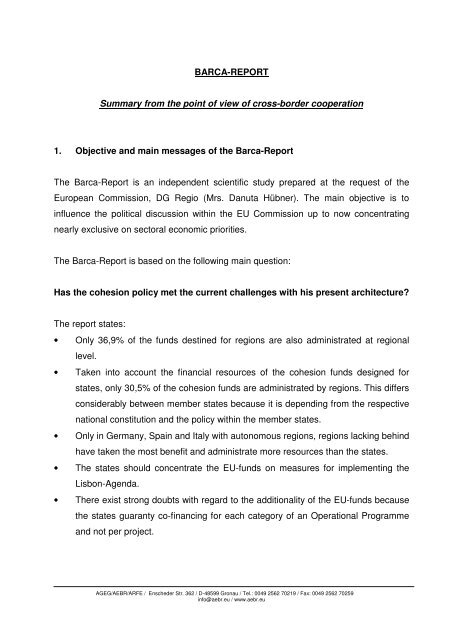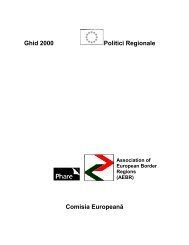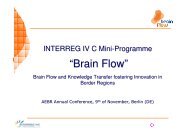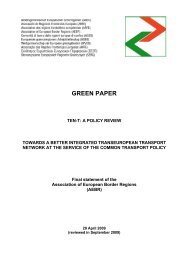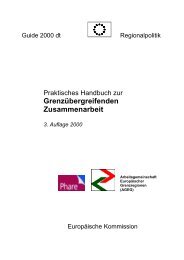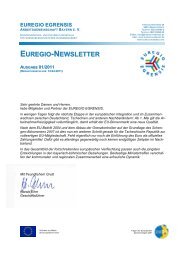Summary Barca-Report E 27-08-09 - Association of European ...
Summary Barca-Report E 27-08-09 - Association of European ...
Summary Barca-Report E 27-08-09 - Association of European ...
You also want an ePaper? Increase the reach of your titles
YUMPU automatically turns print PDFs into web optimized ePapers that Google loves.
BARCA-REPORT<br />
<strong>Summary</strong> from the point <strong>of</strong> view <strong>of</strong> cross-border cooperation<br />
1. Objective and main messages <strong>of</strong> the <strong>Barca</strong>-<strong>Report</strong><br />
The <strong>Barca</strong>-<strong>Report</strong> is an independent scientific study prepared at the request <strong>of</strong> the<br />
<strong>European</strong> Commission, DG Regio (Mrs. Danuta Hübner). The main objective is to<br />
influence the political discussion within the EU Commission up to now concentrating<br />
nearly exclusive on sectoral economic priorities.<br />
The <strong>Barca</strong>-<strong>Report</strong> is based on the following main question:<br />
Has the cohesion policy met the current challenges with his present architecture?<br />
The report states:<br />
• Only 36,9% <strong>of</strong> the funds destined for regions are also administrated at regional<br />
level.<br />
• Taken into account the financial resources <strong>of</strong> the cohesion funds designed for<br />
states, only 30,5% <strong>of</strong> the cohesion funds are administrated by regions. This differs<br />
considerably between member states because it is depending from the respective<br />
national constitution and the policy within the member states.<br />
• Only in Germany, Spain and Italy with autonomous regions, regions lacking behind<br />
have taken the most benefit and administrate more resources than the states.<br />
• The states should concentrate the EU-funds on measures for implementing the<br />
Lisbon-Agenda.<br />
• There exist strong doubts with regard to the additionality <strong>of</strong> the EU-funds because<br />
the states guaranty co-financing for each category <strong>of</strong> an Operational Programme<br />
and not per project.<br />
AGEG/AEBR/ARFE / Enscheder Str. 362 / D-48599 Gronau / Tel.: 0049 2562 70219 / Fax: 0049 2562 70259<br />
info@aebr.eu / www.aebr.eu
Anlage (Nr. einsetzen) zum Protokoll der AGEG-Präsidiumssitzung am 5. Juni 20<strong>09</strong> in Burg (D)<br />
• Regions lacking behind are spending more than 45% <strong>of</strong> the funds for transport,<br />
environment and energy while regions without this status only spend 15% for this<br />
three sectors.<br />
• The poorest regions even allocate 52% <strong>of</strong> the resources for transport and only 5 %<br />
for human capital.<br />
• Regions lacking behind are allocation 13% <strong>of</strong> the funds to research and<br />
development while other regions are spending 22% (remark: an ESPON study<br />
states that 100 receiving most <strong>of</strong> the EU-funds only allocate 0,5% for research and<br />
development while the EU estimates 2-3% as necessary).<br />
• Up to 2006 national mainstream programmes have taken less influence on the<br />
new challenges than EU initiatives outside this mainstream programmes (territorial<br />
cooperation, “Leader Urban” etc.) administrated directly by the <strong>European</strong><br />
Commission.<br />
• From 2007 on all EU initiatives with exception <strong>of</strong> territorial cooperation have been<br />
integrated in national mainstream programmes.<br />
Result:<br />
The present architecture and strategy <strong>of</strong> the coehsion policy is not<br />
suitable to meet the challenges. The EU-resources are used in the<br />
most efficient way where a high degree <strong>of</strong> integration between EU<br />
and national development strategies exists. States with a long<br />
tradition in regional policy have a tendency to work more in parallel.<br />
The cohesion policy is a suitable framework to implement a “placebased<br />
approach”.<br />
The <strong>Barca</strong>-<strong>Report</strong> recommends for the future a priority for a “place-based policy”, that<br />
means:<br />
A long-term strategy to overcome problems <strong>of</strong> potentials not use up to date and for<br />
reducing sustainable social disadvantages in certain places through external<br />
intervention and multi-level governance. Place-based policy supports the supply with<br />
integrated goods and services tailored to respective circumstances and institutional<br />
situation (place-based). Starting up interventions she uses the local knowledge and<br />
actors. The territorial focus is more suitable than all other strategies which are<br />
2<br />
AGEG/AEBR/ARFE / Enscheder Str. 362 / D-48599 Gronau / Tel.: 0049 2562 70219 / Fax: 0049 2562 70259<br />
info@aebr.eu / www.aebr.eu
Anlage (Nr. einsetzen) zum Protokoll der AGEG-Präsidiumssitzung am 5. Juni 20<strong>09</strong> in Burg (D)<br />
bypassing the territorial relations and believe that the state knows everything better. A<br />
territorial social agenda as part <strong>of</strong> the cohesion policy is required (social contract <strong>of</strong> the<br />
EU-citizens).<br />
2. Territorial or „place-based“ dimension<br />
Within the cohesion policy there is not sufficient knowledge concerning what is<br />
influencing and accelerating economic change. The result is a wrong interpretation.<br />
There is a tendency to hinder the territorial character (place-based) and to put him in the<br />
corner “spatial planning”. He is considered separately from the economic and social<br />
perspective and not as a way to realise both dimensions. Such a perspective is only<br />
used in a limited way for programmes (in territorial cooperation, Leader, Urban).<br />
3. Recommendations to improve the present regulations<br />
• Legally defined administrative NUTS-II regions are more suitable as reference<br />
level for policy than for the management <strong>of</strong> EU-programmes.<br />
• The result is that the convergence <strong>of</strong> legal NUTS-II regions is considered to be an<br />
objective <strong>of</strong> the cohesion policy.<br />
• Multi-level governance necessary for the local development policy has to combine<br />
conditionality and subsidiarity.<br />
• National strategies and operational programmes up to now missed the point <strong>of</strong> an<br />
commitment <strong>of</strong> states (and their regions) in order to met EU-criteria.<br />
• In most strategies and operational programmes is not described in a sufficient way<br />
how the objectives and results will be achieved and which instruments will be used<br />
for their implementation.<br />
• In the same way data on quantitative outputs and results are weak.<br />
• The N+2 mechanism requesting to spend money within a certain period <strong>of</strong> time is<br />
even perverting this mechanism: Spending money is more important than<br />
presuming objectives and strategies.<br />
3<br />
AGEG/AEBR/ARFE / Enscheder Str. 362 / D-48599 Gronau / Tel.: 0049 2562 70219 / Fax: 0049 2562 70259<br />
info@aebr.eu / www.aebr.eu
Anlage (Nr. einsetzen) zum Protokoll der AGEG-Präsidiumssitzung am 5. Juni 20<strong>09</strong> in Burg (D)<br />
• For any change a political model is the starting point.<br />
4. Especially on territorial cooperation<br />
4 a) General<br />
The <strong>Barca</strong>-<strong>Report</strong> underlines:<br />
• Identification <strong>of</strong> results is even more difficult than in other programmes because <strong>of</strong><br />
the complexity <strong>of</strong> territorial cooperation, especially because <strong>of</strong> the mixture <strong>of</strong><br />
objectives and lack <strong>of</strong> monitoring and data.<br />
• There are nearly any measurable outputs.<br />
• The results up to now reveal on the other hand that territorial cooperation is<br />
encouraging partners to continue with projects, that otherwise would have never<br />
been implemented.<br />
• There are more qualitative than quantitative effects.<br />
Remark <strong>of</strong> the AEBR: The <strong>Barca</strong>-Bericht is referring to the period up to 2006. For this<br />
period an INTERREG III evaluation is not yet available. But there are a lot <strong>of</strong> projects<br />
known with quantitative outputs.<br />
4b) First preliminarily conclusions <strong>of</strong> the <strong>Barca</strong>-<strong>Report</strong> on territorial cooperation<br />
• Cross-border and transnational cooperation help to overcome institutional barriers,<br />
mobilise finances, support economic, social and cultural exchange and new<br />
relations.<br />
• The intensity is varying very strong. The best results are achieved where<br />
integration and cooperation are already well developed and take place in the<br />
framework <strong>of</strong> existing political and strategic framework conditions.<br />
• New concepts <strong>of</strong> regions and regional identity have been developed as well as<br />
institutions and administrative systems.<br />
• Regional actors have been more operating in fields up to now exclusively<br />
denominated by the states.<br />
4<br />
AGEG/AEBR/ARFE / Enscheder Str. 362 / D-48599 Gronau / Tel.: 0049 2562 70219 / Fax: 0049 2562 70259<br />
info@aebr.eu / www.aebr.eu
Anlage (Nr. einsetzen) zum Protokoll der AGEG-Präsidiumssitzung am 5. Juni 20<strong>09</strong> in Burg (D)<br />
• It is not yet clear whether beside positive and negative effects also economic<br />
efficiency and geopolitical stability could be reached.<br />
• Up to now the transformation <strong>of</strong> territorial cooperation in tangible results is limited<br />
because <strong>of</strong> different factors:<br />
o Lack <strong>of</strong> coordination between EU and national policies as well as<br />
commitment <strong>of</strong> the states.<br />
o Possibilities <strong>of</strong> programmes are used inadequately. That can be found back<br />
in the fact that territorial cooperation hardly is mentioned in national<br />
mainstream programmes.<br />
o There is a lack <strong>of</strong> clarity in the political objectives. Most <strong>of</strong> the programmes<br />
are too large and to vague.<br />
o The territorial programmes are lacking <strong>of</strong> organisational commitment which<br />
is necessary to reach practical results.<br />
o Territorial cooperation is very complex. The projects are dominated by a<br />
multitude <strong>of</strong> different languages, cultural differences and the challenge to<br />
overcome sectoral barriers.<br />
o For the period 2007-20013 information is not yet available which could allow<br />
conclusions on the possible results.<br />
4c) Role <strong>of</strong> the regions<br />
• Since 1998 the influence <strong>of</strong> the regions on EU-programmes has considerably<br />
improved, for instance in elements like elaboration and implementation <strong>of</strong><br />
programmes as well as selection <strong>of</strong> projects (in Italy and the Great Britain) and<br />
through decentralised <strong>of</strong>fices (in Sweden and Finland).<br />
• New regional levels have been created in many states or the capacity <strong>of</strong> the<br />
regions has been strengthened (e.g. Finland, Ireland, Italy, Netherlands and<br />
Sweden).<br />
• In parts <strong>of</strong> South-, Central and Eastern Europe considerable deficits can be stated.<br />
• Since 2000 a re-centralisation can be stated from the regional to the national level<br />
(in the Netherlands and Sweden) or from the local to the regional level (in Flanders<br />
and Scotland).<br />
5<br />
AGEG/AEBR/ARFE / Enscheder Str. 362 / D-48599 Gronau / Tel.: 0049 2562 70219 / Fax: 0049 2562 70259<br />
info@aebr.eu / www.aebr.eu
Anlage (Nr. einsetzen) zum Protokoll der AGEG-Präsidiumssitzung am 5. Juni 20<strong>09</strong> in Burg (D)<br />
• The influence <strong>of</strong> the cohesion policy on regionalisation is difficult to prove unless in<br />
the EU-regulation a stronger commitment <strong>of</strong> regions is explicit requested (the EU<br />
is the natural ally <strong>of</strong> the regions).<br />
• Only in some special cases region-specific programmes and selection <strong>of</strong> projects<br />
on regional level (with the most successful results) exists.<br />
• There is a discrepancy between decentralisation from the states to the regions and<br />
from the regions to the local level.<br />
• Especially regions with legal competences do not have the attitude to realise a<br />
place-based approach on local level.<br />
4d) Capacity <strong>of</strong> the local level and mobilising the actors<br />
• The objective is to improve the decentralised knowledge with regard to the priority<br />
and capacity to realise projects on regional and local level = that is place-based<br />
approach in partnership.<br />
• The principle <strong>of</strong> partnership has strongly influenced changements in the territorial<br />
relationships between organisations and within all administrations.<br />
• Where this mobilisation was successful a better knowledge and a stronger<br />
involvement <strong>of</strong> actors can be stated.<br />
• Where this is not the case, a more static situation can be found.<br />
• Unorganised actors within a region are not capable to fulfil their role<br />
(Counterexample: organised Euroregions).<br />
• Better results are achieved within EU-initiatives directly administrated by the<br />
<strong>European</strong> Commission.<br />
• Separated from the national mainstream programme, these initiatives are<br />
contribution to new ideas, political integration, mobilisation etc. (territorial<br />
cooperation, Leader, Urban).<br />
4e) Financial instruments and controlling<br />
• Most suitable results have been achieved where costs and administrative burdens<br />
have been the lowest.<br />
6<br />
AGEG/AEBR/ARFE / Enscheder Str. 362 / D-48599 Gronau / Tel.: 0049 2562 70219 / Fax: 0049 2562 70259<br />
info@aebr.eu / www.aebr.eu
Anlage (Nr. einsetzen) zum Protokoll der AGEG-Präsidiumssitzung am 5. Juni 20<strong>09</strong> in Burg (D)<br />
• The system <strong>of</strong> the EU-cohesion funds is far from this.<br />
• The discussion on EU-level is concentrating in the first place on controlling related<br />
to financial irregularities and not on contents.<br />
• Integrated development has lost substance, initially in the states and than in the<br />
EU-Commission.<br />
• Negotiations between EU and member states are first focussed on money and<br />
than on objectives. This is irrational if you want to reach previously formulated<br />
political goals.<br />
F:\DATA\334 AGEG\REFERATEundSTELLUNGNAHMEN\20<strong>09</strong>\<strong>Barca</strong>-<strong>Report</strong> 28-04-<strong>09</strong>\Stellungnahme <strong>Barca</strong>-Bericht für Vorstandssitzung E <strong>27</strong>-<strong>08</strong>-<strong>09</strong>.doc<br />
7<br />
AGEG/AEBR/ARFE / Enscheder Str. 362 / D-48599 Gronau / Tel.: 0049 2562 70219 / Fax: 0049 2562 70259<br />
info@aebr.eu / www.aebr.eu


